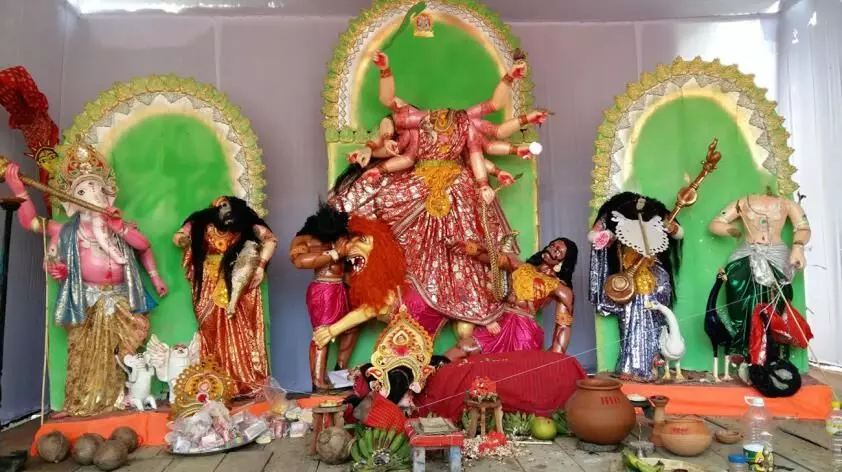A concerning dampener
The attack by communal fanatics on Durga Puja celebrations in Bangladesh, ostensibly with the complicity of a segment of the government, was emblematic of a nefarious agenda

Durga Puja in Bangladesh, observed with great fervour by nearly one crore Hindu minority, is now over after the immersion of the deities in Buriganga river on October 24. All police bandobast was in place to ensure law and order and tranquil as the communal fanatics were expected to cause disturbances. This apprehension came from the fact that many Durga idols were desecrated at regular intervals preceding the commencement of the puja celebrations, fuelling a sense of insecurity amongst the Hindus who are already reeling under threats of losing their immobile possessions, forced conversions in many cases and other perils. Having said this, it shouldn’t be insinuated that the government or the local administration didn’t extend appropriate security measures to provide safety. The zealots in the political parties and, possibly, also in a segment of the government, have prevailed over the government for certain undesirable and sensitive steps which construed dampeners to the long-awaited Durga Puja which numbers nearly over 34,000 pandals all over Bangladesh.
To illustrate the point, more specifically, certain district administrations like Hobigunj, Kumilla etc. issued notifications.
Objectively speaking, the notifications were insensitive, appearing intimidating. Why? Because they stated that Prasads shouldn't contain anything intoxicating, and there shouldn't be any loud celebrations causing 'high' decibels of noise. Hindu activists feel that this was done to appease Islamic hardliners. Worse still, there were prominent notifications hanging right near the Durga idols outlining the different Namaz timings so that Hindu rituals did not interfere with Islamic prayers. This was seen as a clear message to the minorities to stay within their limits and, on the other hand, a signal to the radicals that the government is aware of the majority's sensitivity and is pandering to the communalists.
It doesn't stop here. A ruling party MP was repeatedly shown on TV calling upon the puja organisers to follow the "guidelines" issued by the administration. If the MP was involved in disseminating the "instructions," then the complicity of the government or the ruling party can't be ruled out. Hindus in Bangladesh are equally sensitive to their religious responsibilities, and such strong-arm tactics certainly do not bode well.
Now, the question is: What was the idea behind the administrative agencies implementing these dampening measures when elections are only three months away? Independent analysts feel that the assessment made by the ruling party and the agencies indicates that Hindu minority votes may not matter at all in the electoral fray. So, even if the minority groups are slighted, their votes will be inconsequential. On their part, minorities are left with no option but to vote for the ruling Awami League (AL). Having made this calculation, it was perhaps decided that such measures, however dampening or unsavoury, could be enforced. In other words, minority sentiments were not factored in.
While discussing these communal issues, it becomes imperative to address the balancing act the AL is treading upon to handle the elections. Hefazat-e-Islam, a dangerously communal outfit nearly 13 years old and headquartered in Chittagong, is suspected to be enjoying the blessings of the ruling AL. It was possibly formed to counter another communal and fanatic anti-India and pro-Pakistan body, the Jamaat-e-Islami (JeI), but over time, it exceeded its agenda and outsmarted its mentors. It was visible by the fact that it set off a trail of communal frenzy and violently targeted the Hindu minority, including their property.
Having to deal with its own Frankenstein, the ruling party is now at a loss to deal with Hefazat, which has not only doubled its tentacles and activities but also amassed huge financial reserves to spend on destructive missions. Many within the AL are strongly suspected of supporting the outfit for political gain. Some influential figures in the government are sadly adopting an ostrich-like attitude, fearing that they might have to address the challenges. This is certainly detrimental to minority interests.
Meanwhile, some authoritative and knowledgeable sources claim that the Member of Parliament from Chittagong's 15th constituency, Abu Reza Mohammad Nadwi, remains in touch with Jamaat, pro-Pakistan, and anti-India elements to garner support from the Islamic hardliners' bloc to keep them on their side. In Chittagong, there is the Alamma Fazlullah Foundation, which is staunchly pro-Jamaat, anti-Hindu, and significantly receives substantial funding from Middle Eastern countries regularly. Such funding may be used against political adversaries, especially non-fanatics, to further the agenda of the Wahabis and Salafis, targeting the minority and resorting to communal violence. This also emboldens the pro-Pakistan lobby active in Bangladesh, which is looking for an opportunity to prevent the Hasina government from triumphing in the upcoming elections. They may not succeed in their blueprint, but their agenda remains. The plan needs to be thwarted now so that elections do not witness any communal violence, and secular interests are not harmed. This is particularly essential in view of the charged atmosphere arising from the Israel-Hamas military confrontation, leading to a heavy polarisation and radicalisation of religious ultras.
The writer is a retired IPS officer, Adviser NatStrat, and a former National Security Advisor in Mauritius. Views expressed are personal



